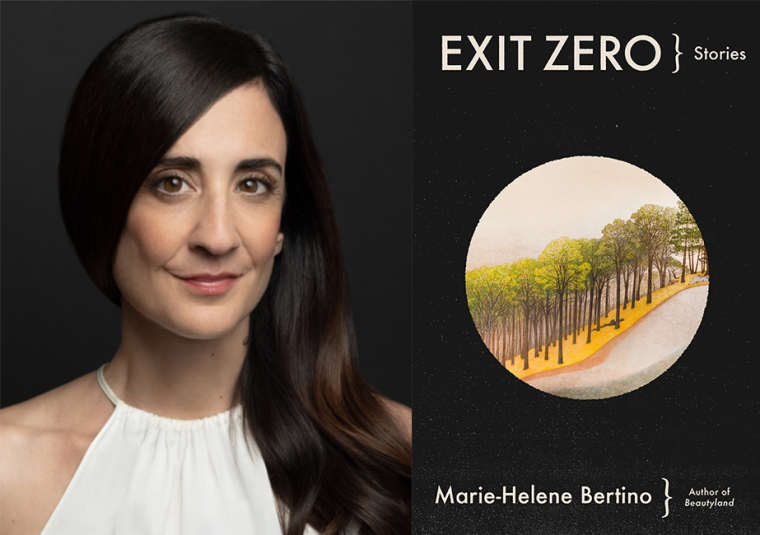This week’s installment of Ten Questions features Marie-Helene Bertino, whose story collection Exit Zero is out today from Farrar, Straus and Giroux. The twelve stories in this collection are populated by vampires, ghost girls, fathers, blank spaces, day-old peaches, and famous paintings. Death-shaped entities haunt the narratives in Exit Zero and offer readers flashes of wisdom, even as the stories entertain with Bertino’s characteristic humor and wit. In Harper’s Bazaar, Chelsey Sanchez wrote that Exit Zero cuts “at the core of what it means to be alive.” A review in Publishers Weekly agreed, stating that in this new collection, “Bertino once again displays her formidable talent for the uncanny.” Marie-Helene Bertino is the author of the novels Beautyland (Farrar, Straus and Giroux, 2024), Parakeet (Farrar, Straus and Giroux, 2020) and 2 A.M. at The Cat’s Pajamas, (Crown, 2014) and the story collection Safe as Houses (University of Iowa Press, 2012). She was the 2017 Frank O’Connor International Short Story Fellow in Cork, Ireland. She has received the O. Henry Prize, the Pushcart Prize, the Iowa Short Fiction Award, the Mississippi Review Prize, and fellowships from the Guggenheim Foundation, MacDowell, Sewanee, and New York City’s Center for Fiction. Her work has been anthologized in Best American Short Stories, PEN/O. Henry Prize Stories, and Mississippi Review 30. She is the Ritvo-Slifka Writer-in-Residence at Yale University.

Marie-Helene Bertino, author of Exit Zero. (Credit: Beowulf Sheehan)
1. How long did it take you to write Exit Zero?
I’ve been working on the stories of Exit Zero for around twelve years, since my last collection Safe as Houses (University of Iowa Press, 2012) was published. In between long stretches of novel writing, it’s a joy to noodle around on a short story.
2. What was the most challenging thing about writing the book?
The fun challenge is solving each story’s unsolvable knot—Rebecca Makkai calls it “the big impossible thing”—and the real challenge is balancing my writing life and non-writing life.
3. Where, when, and how often do you write?
My definition of writing is expansive, so I consider things like watching movies and having deep conversations and taking a botany class as writing. If you have a robust meditation practice, you’re kind of always meditating, and I feel the same way about writing.
4. What are you reading right now?
Kevin Nguyen’s Mỹ Documents (One World, April 2025), Han Kang’s We Do Not Part (Hogarth, January 2025), and Amber Sparks’s Happy People Don’t Live Here (Liveright, October 2025).
5. Which author, in your opinion, deserves wider recognition?
Every author who is meaningfully concerned with creatively and ethically rendering the experience of life but doesn’t have the privilege of a big book deal and/or celebrity deserves wider recognition.
6. What is the biggest impediment to your writing life?
To my writing life: me. To my publishing life: those who believe there is only one way to write a novel or a short story.
7. What is one thing that your agent or editor told you during the process of publishing this book that stuck with you?
Claudia Ballard, my agent, said, “Your work is not for everyone, nor should it be.”
8. If you could go back in time and talk to the earlier you, before you started Exit Zero, what would you say?
Intuition is enough.
9. Outside of writing, what other forms of work were essential to the creation of Exit Zero?
Exit Zero contains many modes of connecting through impossible circumstances (exes as rain, invisible bodies, balloons sent from the ether). I studied profound ways to connect in an End-of-Life Facilitation program and subsequent training at a home for the dying. I learned that dying people in hospice mention forms of transportation that existed in parts of their life that are sometimes unknown to their loved ones. A dying person might insist over and over, I need to get my ticket for the ship and later, the family will discover that their loved one once had an important ship journey. This can be a readying for end of life. Teaching is also inordinately important—at some points while teaching I feel like a dream interpreter, an opportunity enthusiast, an architect.
10. What’s the best piece of writing advice you’ve ever heard?
Here are a few gems I carry in my pocket:
“The ending should be a profound reimagining of the beginning.” —Christine Schutt
Choose a tense and flashbacks based on how comfortable the characters are with their pasts (paraphrasing Charles Baxter).
“Rejection is protection,” a student named Jasper at the Institute of American Indian Arts said to me.
“You don't have to believe it. You just have to believe that I believe it.”—Stephen King
Get in late, get out early (paraphrasing screenwriters).
“A smooth sea never produced a skillful sailor.”—a pillow I saw once
“Only those with palpably alive souls run the risk of becoming soul-weary.” —my college professor Father Lee
“Most people aren’t writers, so don’t worry what they say.” —Michael Cunningham







